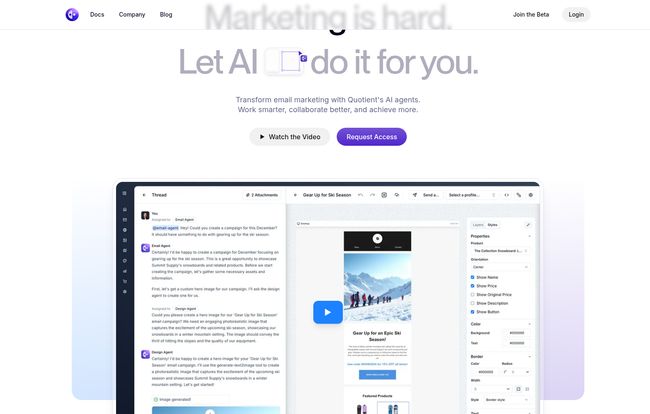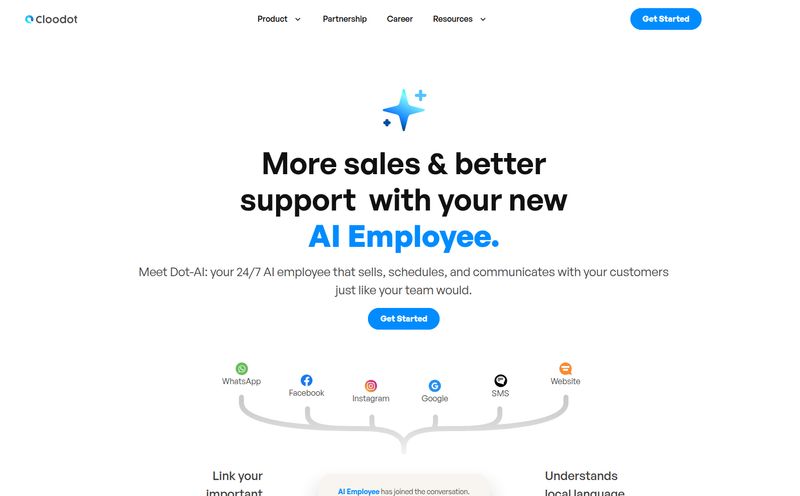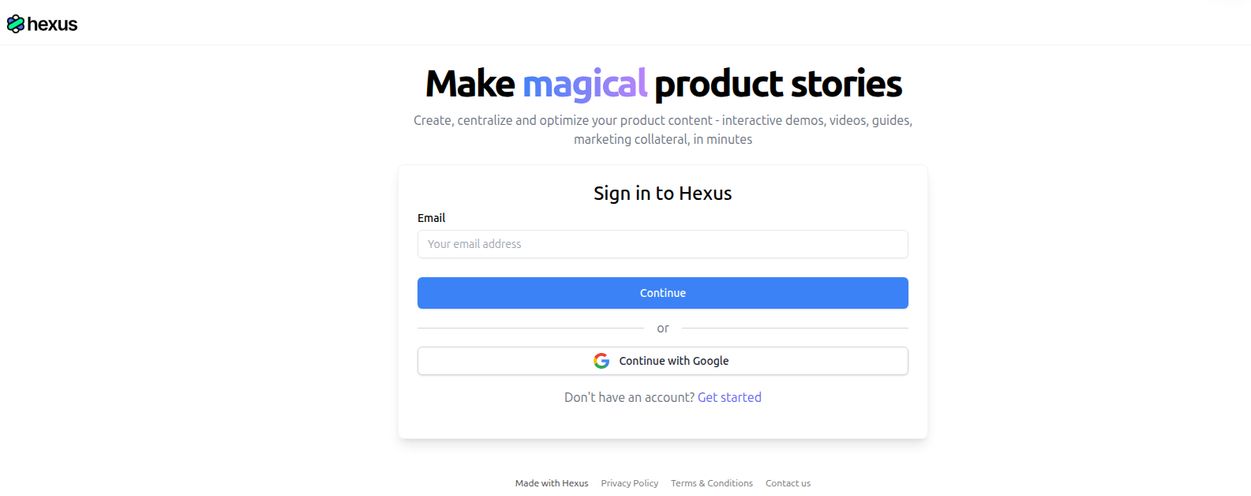If you're in the trenches of digital marketing, especially for an e-commerce brand, your life is a constant juggling act. You’ve got your email platform over here, your landing page builder over there, a separate tool for analytics, and probably a Canva subscription for good measure. It’s… a lot. And honestly, it’s exhausting.
For years, the solution has been to either hire a dedicated team or outsource to a pricey agency. Both have their merits, but they also have one thing in common: they cost a lot of money. So when I saw a platform pop up with the tagline, "Let AI do the hard work," my seasoned, slightly cynical marketing brain perked up. The platform is called Quotient, and it's not just another tool. It's pitching itself as your new AI marketing team.
A bold claim. A very bold claim. But after digging into what they're building, I have to admit, I'm intrigued. This might just be the shift many of us in the Shopify ecosystem have been waiting for.
So, What Exactly Is Quotient?
Forget thinking of Quotient as just another piece of software. That’s not the right frame. The way they present it, it’s more like hiring a team of hyper-efficient, data-driven robot assistants who live in your browser and never ask for a day off. Their whole purpose is to take the grunt work out of marketing so you can focus on strategy and growth.
At its core, Quotient is an all-in-one marketing platform powered by a suite of AI agents. It’s designed to handle everything from building entire email campaigns to generating product images and even deriving insights from your sales data. The big focus here seems to be on the e-commerce world, with a special, almost loving, emphasis on Shopify integration. For any of you running a Shopify store, you know how critical a smooth integration is. It’s not just a nice-to-have; it's the whole ballgame.
The Features That Actually Matter
A platform is only as good as its features, right? Here’s where Quotient tries to stand out from the crowded marketing tech space.
Your Personal AI Marketing Squad
This is the coolest part, in my opinion. Instead of just giving you templates, Quotient gives you AI agents. You can tell an agent to build an engaging email, and it will. Need a landing page for a flash sale? There's an agent for that. Need to generate some slick lifestyle shots of your products without a photoshoot? Yep, AI agent. This shifts the workflow from doing to directing. You become the marketing director, and the AI is your team of specialists executing your vision. It's a fundamental change in how we approach campaign creation.
Email Marketing That Doesn’t Feel Robotic
I know, I know. "AI-powered email marketing" sounds like a recipe for soulless, robotic copy. We’ve all seen it. But Quotient seems to be aiming higher. The platform claims to help you build campaigns in minutes, not months, by understanding your brand's voice and your customers' behavior. It can tailor outreach by identifying the optimal email style for each individual customer based on their past interactions. That's a step beyond simple segmentation. Plus, the inclusion of a Figma-style editor for crafting emails and pages is a nice touch for those of us who like granular control over the final look and feel.

Visit Quotient
Deep Shopify Integration
This is a biggie. A really big one. Quotient is built to talk to Shopify fluently. It learns your product catalog, understands your customers, and analyzes your sales data to inform its marketing suggestions. This means you’re not just sending generic blasts. You’re sending targeted, relevant campaigns based on actual purchase history and user behavior pulled directly from your store. This seamless connection is what separates a truly useful e-commerce tool from a generic one.
A Unified Command Center
Remember that juggling act I mentioned? Quotient's goal is to end it. By bringing email, automation, analytics, landing pages, and image generation under one roof, it eliminates the chaos of tab-switching and trying to make five different tools play nice together. The platform also features a "multiplayer" mode, allowing your human team members to collaborate with each other and the AI agents in one unified space. It’s a small detail, but for growing teams, it’s a godsend.
Can Quotient Really Replace Your Marketing Agency?
Okay, the million-dollar question. The big promise is that you can reduce your reliance on expensive agencies. And on paper, the potential is there. You get speed, 24/7 availability, and data-driven personalization at what is presumably a fraction of the cost of a human team.
Here's a quick breakdown of my thoughts on this:
| The Good Stuff (The Pros) | The Reality Check (The Cons) |
|---|---|
| Speed & Efficiency: AI can draft a campaign in minutes. No more waiting days for copy or design revisions. | It's in Beta: This means you're an early adopter. Expect some bugs, quirks, and features that aren't fully fleshed out yet. |
| Cost Savings: The potential to save thousands per month compared to agency retainers is undeniable. | Garbage In, Garbage Out: The AI is only as good as the strategy and data you feed it. You still need a human with a vision. |
| Unified Platform: One login, one bill, one integrated system. The simplicity is a massive selling point. | The Human Touch: An AI can't hop on a brainstorming call or understand the subtle cultural context of a new meme. Strategy and creativity still need a human driver. |
So, can it replace an agency? For some businesses, absolutely. For a startup or a small business that needs to execute solid, data-driven marketing without a six-figure budget, Quotient could be a game-changer. For a large enterprise with complex, multi-channel creative campaigns, it's more likely to be a powerful tool that assists the agency, rather than replaces it entirely.
Let's Talk Money: The Quotient Pricing Question
Here's the rub. As of right now, Quotient's pricing is not public. The website prompts you to "Join the Beta" or get in touch. Typically, this model suggests that they're either still finalizing their pricing tiers or they're focusing on a custom/enterprise-level solution where the price is tailored to the client's needs.
Don't let that scare you off. It often means you can get a plan that's a better fit than a generic Small, Medium, or Large package. My advice? If you're intrigued, it costs nothing to join the beta waitlist or reach out. Being an early adopter often comes with perks, like preferential pricing or more direct access to teh development team.
A Few Final, Honest Thoughts
I've been in the SEO and traffic generation game for a long time. I've seen dozens of platforms promise to be the 'next big thing'. Some fizzle out, and some, like HubSpot back in the day, genuinely change how we work. Quotient has that same disruptive feel to it.
The idea of an AI team rather than an AI tool is a powerful mental shift. It reframes the user's role from a hands-on-keyboard creator to a high-level strategist and director. That's compelling.
However, I'm also a realist. The effectiveness of this platform will hinge entirely on the quality of its AI. If the copy it generates is generic, if the images look uncanny, or if the insights are obvious, then it's just another shiny object. But if they get it right… if the AI is truly smart, adaptive, and helpful… then Quotient could set a new standard for what we expect from our marketing software.
Conclusion: Is Quotient the Future or Just a Fad?
Look, the move towards AI-assisted workflows is inevitable. We're seeing it everywhere from content creation with tools like Jasper to code generation with GitHub Copilot. Marketing is the natural next frontier. Quotient is not just dipping a toe in the water; they're diving in headfirst with a comprehensive, integrated approach.
While it’s still early days (hello, Beta!), the vision is clear and powerful. For the Shopify store owner, the solopreneur, or the lean marketing team feeling perpetually overwhelmed, Quotient presents a genuinely exciting possibility: the ability to run your marketing like a Fortune 500 company, without the Fortune 500 budget. It's one I'll be watching very, very closely.
Frequently Asked Questions
What is Quotient?
Quotient is an all-in-one, AI-powered marketing platform designed to function like a virtual marketing team. It helps businesses, especially e-commerce stores, create and manage email campaigns, landing pages, product imagery, and marketing automation from a single dashboard.
Is Quotient good for Shopify stores?
Yes, it appears to be specifically optimized for Shopify. Its deep integration allows the AI to learn from your product catalog, customer data, and sales history to create more personalized and effective marketing campaigns.
How much does Quotient cost?
Currently, Quotient does not have public pricing. The platform is in beta, and interested users are encouraged to join the waitlist or contact their team for details. This often points towards custom pricing based on your business's needs.
Is Quotient difficult to use?
The platform is designed to simplify marketing. Instead of you doing all the work, you direct AI agents to perform tasks. While there will be a learning curve, its goal is to be more efficient and user-friendly than juggling multiple complex marketing tools.
Can Quotient completely replace my marketing team or agency?
It depends. For smaller businesses or startups, it has the potential to handle the work of a small team or a basic agency retainer. For larger companies, it's more likely to be a powerful tool that augments the existing human team, automating repetitive tasks and freeing them up for higher-level strategy.
What makes Quotient different from Mailchimp or Klaviyo?
While tools like Mailchimp and Klaviyo are primarily focused on email marketing and automation, Quotient aims to be an all-in-one platform. It integrates AI agents for a wider range of tasks, including landing page creation and AI image generation, positioning itself as a comprehensive marketing 'team' rather than just an email tool.
Reference and Sources
- Quotient Official Website
- Shopify's Guide to Marketing Automation
- AI in Digital Marketing: The Ultimate Guide via Search Engine Journal



